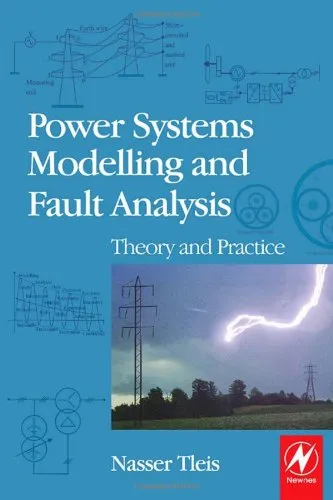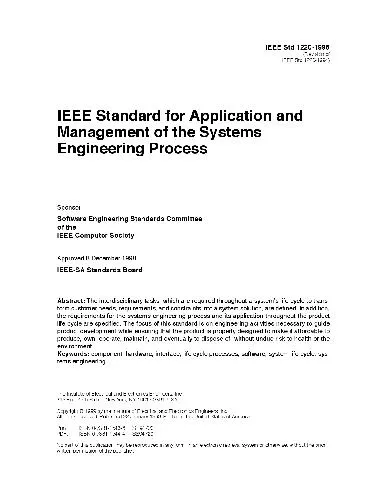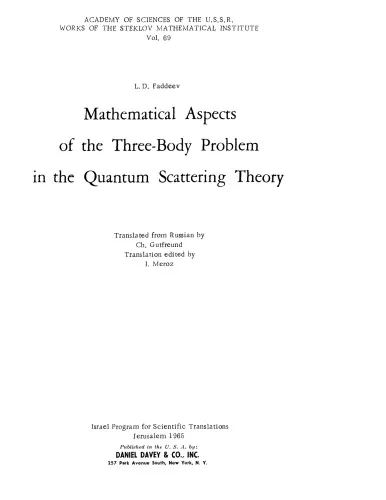Power Systems Modelling and Fault Analysis: Theory and Practice (Newnes Power Engineering Series) (Newnes Power Engineering Series)
4.5
Reviews from our users

You Can Ask your questions from this book's AI after Login
Each download or ask from book AI costs 2 points. To earn more free points, please visit the Points Guide Page and complete some valuable actions.Related Refrences:
Welcome to an in-depth exploration of "Power Systems Modelling and Fault Analysis: Theory and Practice," a seminal work authored by Nasser Tleis. This book is a comprehensive guide designed to equip professionals, researchers, and students in the field of electrical engineering with advanced knowledge on power systems modeling and fault analysis. With a meticulous blend of theoretical foundations, practical applications, and industry-relevant examples, this book stands as an essential resource for anyone looking to deepen their understanding of power system dynamics.
Detailed Summary of the Book
"Power Systems Modelling and Fault Analysis" thoroughly examines the integral components of power systems and their interconnections, focusing primarily on modeling techniques and fault analysis methodologies. The book begins by laying the groundwork with fundamental concepts in power systems operation, delving into power generation, transmission, and distribution. From here, it transitions into more complex topics, providing detailed analyses of electrical circuits, control mechanisms, and system stability.
A significant portion of the text is dedicated to methodologies for fault analysis in power systems. This includes both balanced and unbalanced fault conditions, using tools such as symmetrical component theory. The author provides readers with robust mathematical models and computational techniques to effectively predict and analyze system responses to faults. Practical examples, along with case studies, offer insights into real-world applications and the impact of faults on the reliability and efficiency of power systems.
Key Takeaways
- Comprehensive understanding of the behavior and dynamics of power systems under various operational scenarios and fault conditions.
- Proficiency in applying mathematical and computational tools for power system analysis.
- Insights into the implications of power system faults on overall network reliability and efficiency.
- Ability to utilize modern analytical techniques and software tools for power system modeling and simulation.
- Enhanced problem-solving skills applicable to designing resilient power system architectures.
Famous Quotes from the Book
"The essence of power system analysis lies not only in understanding the theoretical foundations but also in mastering the application of these concepts to enhance the operation and resilience of the system."
"Fault analysis is not merely a technical challenge; it is a critical aspect of ensuring the reliability and safety of modern power networks."
Why This Book Matters
In an era where power systems are becoming increasingly complex and interconnected, the need for sophisticated modeling and fault analysis is more pressing than ever. This book is vital for several reasons. It serves as a bridge between academic theory and practical application, offering readers the tools they need to navigate the challenges faced by today’s power systems engineers.
Moreover, as renewable energy sources and smart grid technologies are integrated into traditional power systems, understanding their impact on system dynamics and fault behavior becomes crucial. Nasser Tleis addresses these contemporary issues, preparing readers to engage with future challenges in power systems engineering.
Free Direct Download
You Can Download this book after Login
Accessing books through legal platforms and public libraries not only supports the rights of authors and publishers but also contributes to the sustainability of reading culture. Before downloading, please take a moment to consider these options.
Find this book on other platforms:
WorldCat helps you find books in libraries worldwide.
See ratings, reviews, and discussions on Goodreads.
Find and buy rare or used books on AbeBooks.
1475
بازدید4.5
امتیاز0
نظر98%
رضایتReviews:
4.5
Based on 0 users review
Questions & Answers
Ask questions about this book or help others by answering
No questions yet. Be the first to ask!














